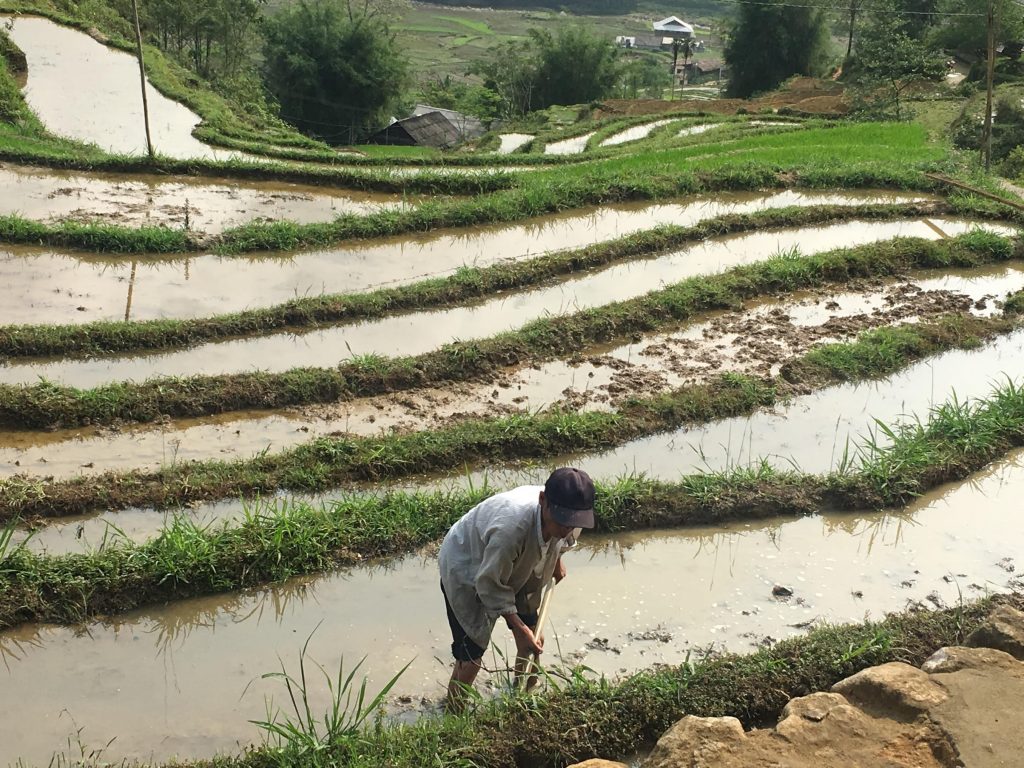In the Spring of 2019, I had the amazing opportunity to travel to Vietnam and Cambodia through a new field school led by Capilano University’s School of Tourism Management. Though this was not a study abroad experience offered through IDEA School of Design, I knew that this was an experience that I did not want to give up. Though the two-week trip was from late April to early May, there was a lot to prepare before studying abroad. I had to attend eight pre-departure classes starting in January. In these classes, I learned some background behind Vietnam and Cambodia, tourism development in these countries, and different tourism topics such as heritage tourism, volunteer tourism, and adventure tourism. Having previously known nothing about tourism as a design-focused student, there was a lot of content to learn, but it was all very interesting.
After fifteen hours of riding in a plane, we hit the ground running in Siem Reap, Cambodia. When we first arrived, we were greeted with intense heat. It turned out that we had arrived just when Cambodia was experiencing a heat wave. Every day, it was around 38 degrees. In the first two nights, we stayed at Baby Elephant Boutique, an ethical and sustainable social enterprise hotel. Our main mode of transportation was by “tuk-tuk”, a motorized rickshaw.
During the first day, we went to see visit APOPO, where they train giant rats to detect landmines.
We also visited several other NGOs to including ChildSafe Protection, where we learned about the serious issues behind orphanage tourism, as well as Volunteer Building Cambodia, an organization that helps build houses for those in need. On the third and fourth night, we stayed in homestays in Banteay Srey. The homestays were in traditional Rural Khmer houses – essentially wooden houses on stilts.
Before we even made it to the front door of our homestay, there was a group of children laughing and smiling in the front yard and they ran up to greet us. Despite the language barrier, the children were eager to teach me games and try to communicate to me with hand signals and the little English that they knew. We counted together from 1-30 first in Khmer, and then in English. We also sang the ABCs and Baby Shark (How did they learn about that song?!) They showed me their makeshift “monkey bars” made from a fallen sugar cane plant nested between two trees and their “swing”, which was a lowered banana tree leaf that they would grab onto and swing around. Surrounding the house were mango trees, banana trees, papaya trees, and pineapple bushes. Chickens were running around everywhere and buffalos laid low in the tall grass while stray dogs bathed in the sun.
Staying in this environment was completely out of my comfort zone but was also a huge learning experience for me. On our last night in Banteay Srei, we had dinner in the middle of a large open field surrounded by trees. The view was gorgeous.
We had the unforgettable opportunity to hear from a group of local women who had survived the horrific Cambodian genocide under the rule of the Khmer Rouge. After dinner, the local people played and sang songs as we all danced and laughed together.
On our last day in Cambodia, we visited one of the seven wonders of the world – the breathtaking Angkor Wat.
The next day, we flew to Hanoi, Vietnam. Waking up at 3 am, we went on a “Good Morning Hanoi” tour where we watched the Quang An Flower Market unfold. We also visited Hoan Kiem Lake, where crowds of people participated in tai chi and also group dances. Seeing all this made me honestly want to move to Hanoi! I loved how everyone was so passionate in being active and the large presence of community.
The next day, we visited the Canadian embassy where we met Mr. Robert Bissett, the Counselor for Political, Cultural and Information Affairs. We also had a cultural exchange with a class of students at Hanoi Open University. Aside from attending one of their lectures, there was singing involved too! Their whole class sang I’m Yours for us, while we sang Don’t Stop Believing.
That evening, we hopped onto the Overnight Sleeper Train to Sapa. We were rocked to sleep on the six hour ride until we arrived Sapa in the morning. Once we arrived in Sapa, we commenced on our five-hour trek to the Lao Chai village, home to the Black Hmong people. We hiked through luscious green hills with countless rice patties stacked on top of each other, the water glistening in the hot sun. We came across many stray dogs, ducks, and water buffalo.
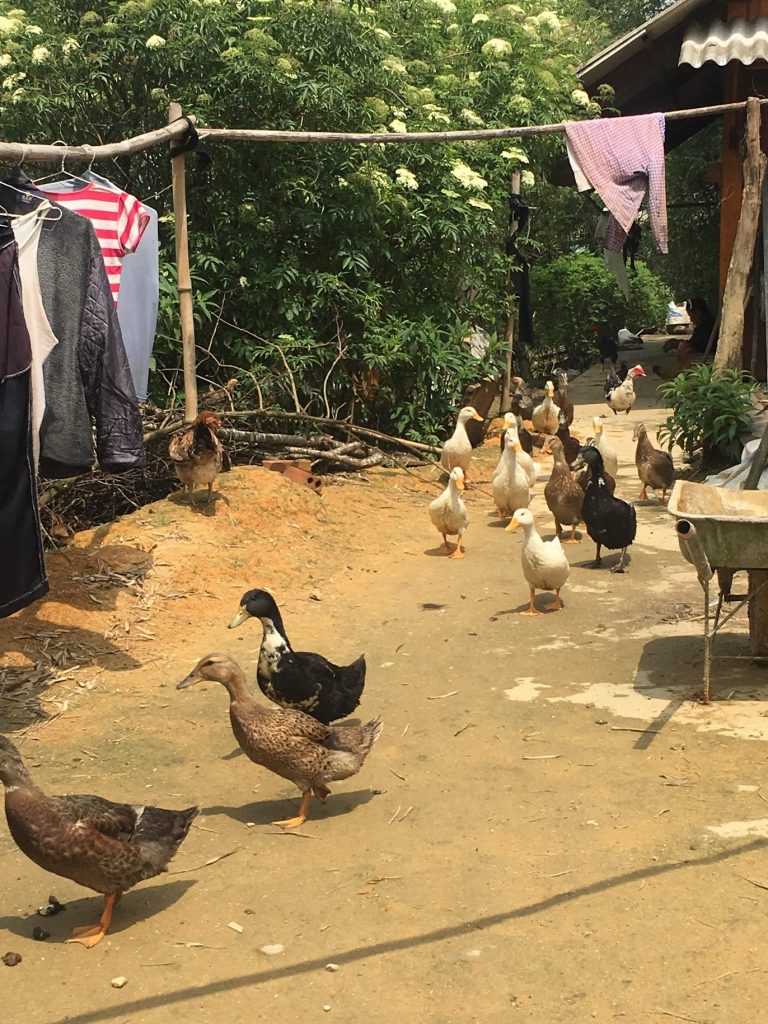
A family of waddling ducks. 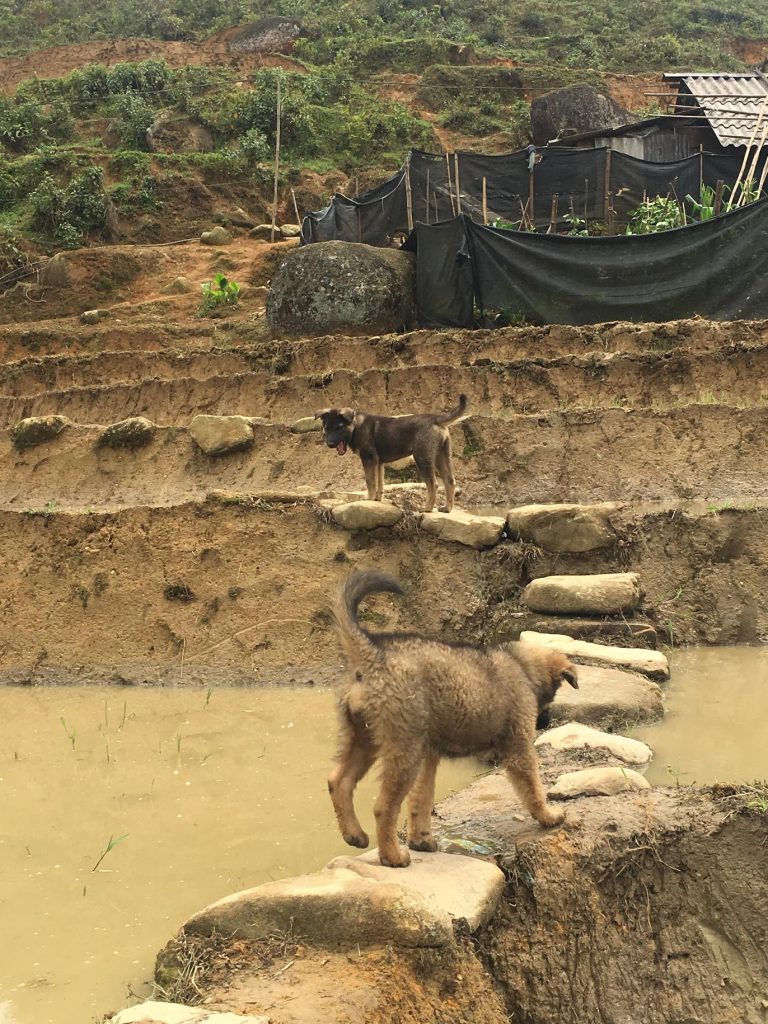
Puppies! 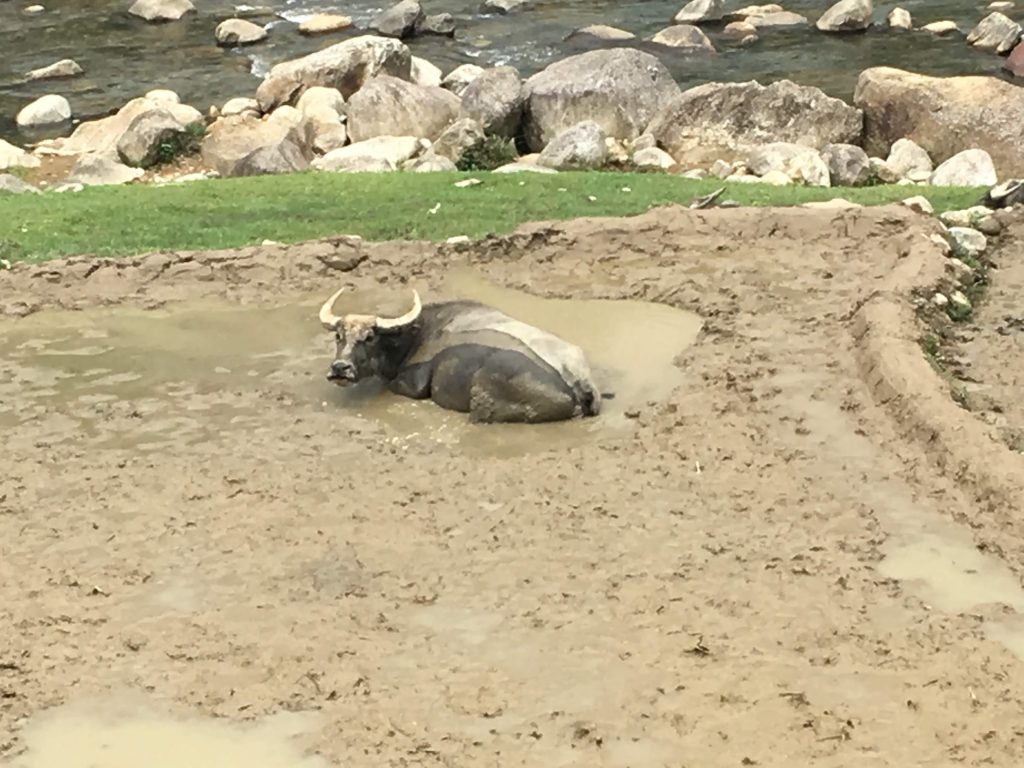
Water buffalo having a relaxing bath in the mud.
When we finally arrived Lao Chai, Eamon, Hedieh, and I were led up to Mr. Chu’s house, our homestay. His house sat atop a steep hill, which revealed a gorgeous view. Peeking through the fog were countless hills and mountains of rice patties. You could see the small village below.
The kitchen was nothing like you would see in Canada. The floors were only the barren rock below. There was a fire pit in one corner, and in the other, a large bucket of water. We helped prepare dinner that night with the family. You can see us slicing vegetables and peeling bamboo shoots. We also learned to make Vietnamese spring rolls, which turned out so delicious! At dinner, I tried to make as much conversation as possible, though the family did not speak much English. We still had good laughs and we got to know each other more.
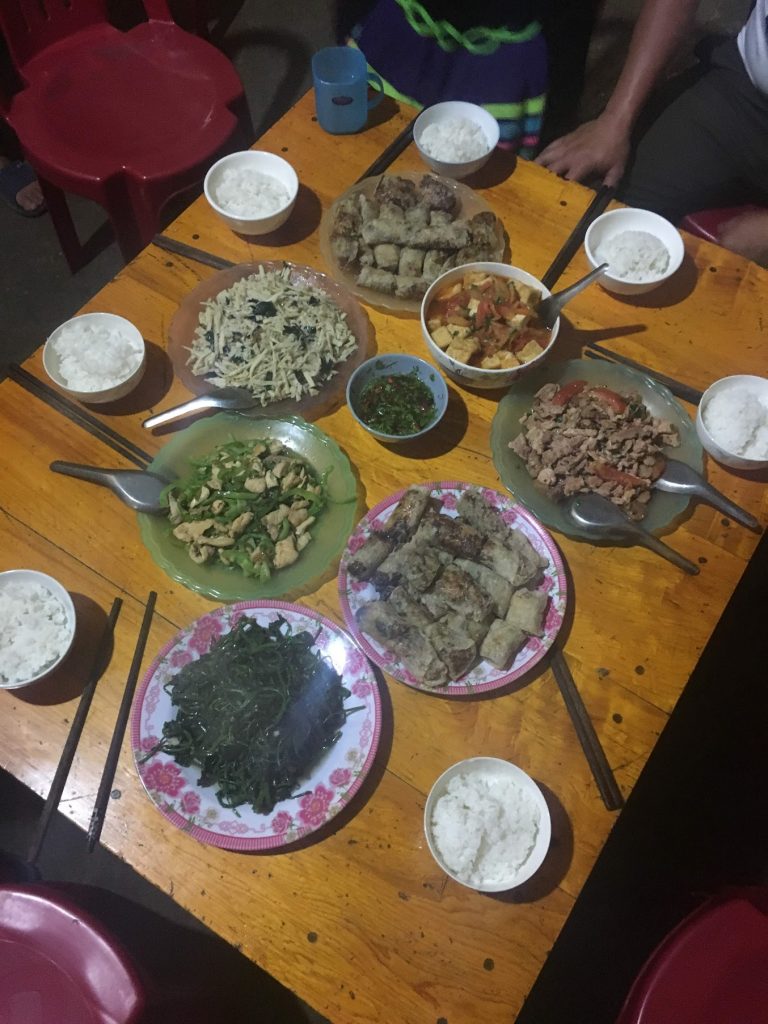
Dinner at our homestay. 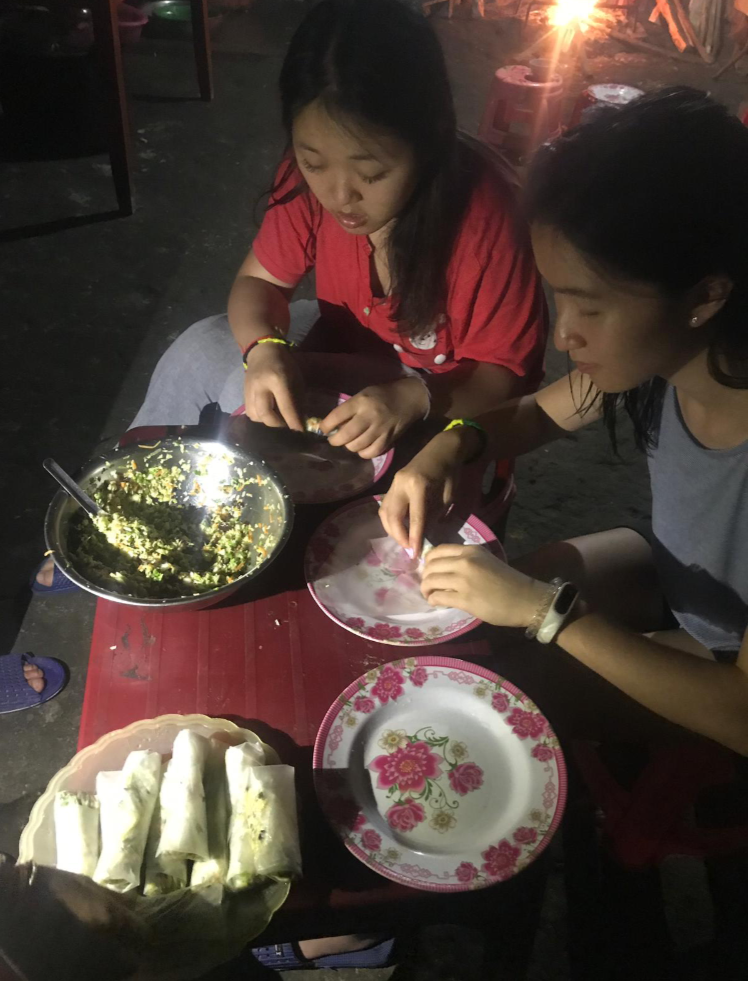
Eamon and I racing to make spring rolls.
After dinner, I shared some photos of Vancouver to them and also taught the family how to play Slap Jack.
During my stay in Sapa, we had to work on a CBT (community-based tourism) project. Mandy, Chantelle, Eamon, Hedieh, Victoria, Teresa, and I were in one group, and we were helped Mimi and Ms. Di’s homestay and batik workshop business. Chantelle and I painted two new large signs for the house and our group collaboratively created a flyer and an infographic for the community’s Batik workshops, both translated into seven different languages. Due to the tight time constraint of two days, it made for a crazy and stressful process.
The signboards were a big challenge. The only supplies we were given were large house paint brushes and chicken feathers for smaller details. Because the paint we were given was also house paint, it took a long time to dry. I tried to use a blow dryer to speed up the process, which didn’t work. They also didn’t have any rulers, so to somewhat center all the words, I used a stick and made markings on it as a makeshift ruler. Making the most out of what little I had to work on this project was an amazing learning experience. It made me realize you don’t need any expensive supplies to create art. I can now proudly add “painting with chicken feathers” to my list of skills in my resume.
I ended up jumping between painting the signboard, designing the posters, and working out the translations back and forth. We worked each day from 8:30 am to 7 pm, before Eamon, Hedieh, and I had to sprint back to our homestay. While we worked on the project, Mimi and Ms. Di would often stop by and look over our shoulders to see what we were working on. We often asked them if they were okay with how it was looking, and they always gave a big smile and a nod.
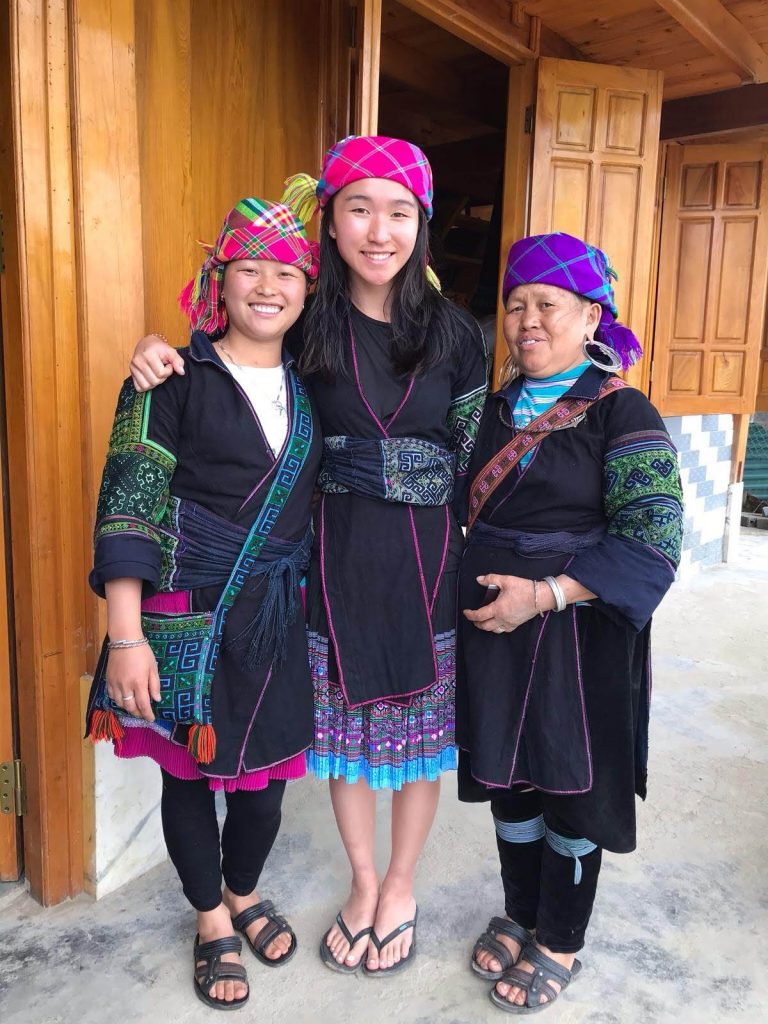
Mimi (left) and Ms. Di (right) 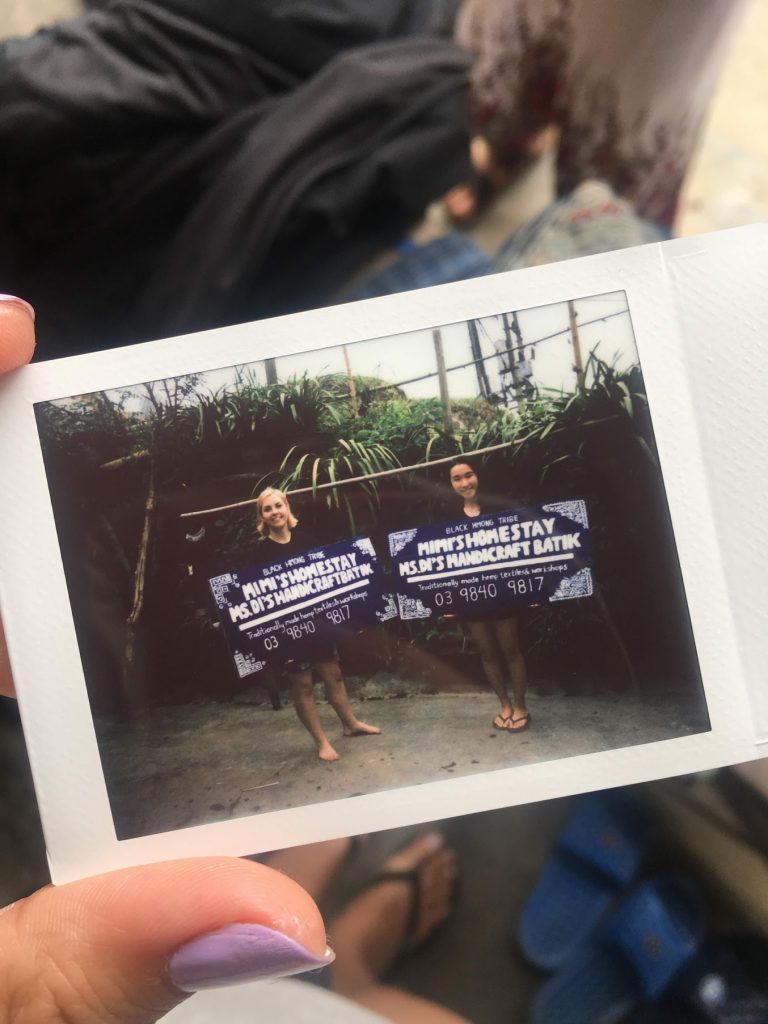
Chantelle and I with the finished signboards!
Watching both of them work hard all day whether it was going out to the fields, painting batiks, or creating new handicrafts, it made everything we were doing so much more meaningful. I wanted to offer any skills I had and help them in whatever way possible.
Before long, it was time to leave Sapa and return to Hanoi. It was a tearful goodbye and then we were off to our bumpy bus ride back to the city. When we arrived back in Hanoi, a few of us met up with students from Hanoi Open University. They brought us to try some local street food and a small, hidden cafe where we sang songs together.
Later in the evening, they invited us to come on their motorbikes and they drove us around Hanoi and West Lake. This was one of my favourite memories from the trip! The feeling of the cold air hitting my face as we whizzed through a sea of cyclists was like no other.
I am so grateful to have had the opportunity to visit Cambodia and Vietnam, especially with such a large group of amazing people. Not only did I learn a whole lot about tourism, but I also got to immerse myself in Cambodian and Vietnamese culture and interact with people from the city and rural areas in both countries. I made so many special memories in the span of two weeks, making it difficult to choose which ones to highlight in this blog. It was truly a life-changing experience like no other and I would highly recommend anyone who has the opportunity to apply for this field school.
